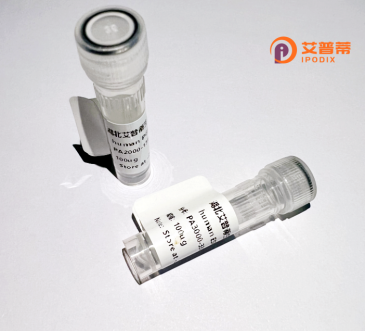
| 纯度 | >90%SDS-PAGE. |
| 种属 | Human |
| 靶点 | PSTK |
| Uniprot No | Q8IV42 |
| 内毒素 | < 0.01EU/μg |
| 表达宿主 | E.coli |
| 表达区间 | 1-348 aa |
| 活性数据 | MKTAENIRGT GSDGPRKRGL CVLCGLPAAG KSTFARALAH RLQQEQGWAI GVVAYDDVMP DAFLAGARAR PAPSQWKLLR QELLKYLEYF LMAVINGCQM SVPPNRTEAM WEDFITCLKD QDLIFSAAFE AQSCYLLTKT AVSRPLFLVL DDNFYYQSMR YEVYQLARKY SLGFCQLFLD CPLETCLQRN GQRPQALPPE TIHLMGRKLE KPNPEKNAWE HNSLTIPSPA CASEASLEVT DLLLTALENP VKYAEDNMEQ KDTDRIICST NILHKTDQTL RRIVSQTMKE AKGNQEAFSE MTFKQRWVRA NHAAIWRIIL GNEHIKCRSA KVGWLQCCRI EKRPLSTG |
| 分子量 | 39.5 kDa |
| 蛋白标签 | His tag N-Terminus |
| 缓冲液 | PBS, pH7.4, containing 0.01% SKL, 1mM DTT, 5% Trehalose and Proclin300. |
| 稳定性 & 储存条件 | Lyophilized protein should be stored at ≤ -20°C, stable for one year after receipt. Reconstituted protein solution can be stored at 2-8°C for 2-7 days. Aliquots of reconstituted samples are stable at ≤ -20°C for 3 months. |
| 复溶 | Always centrifuge tubes before opening.Do not mix by vortex or pipetting. It is not recommended to reconstitute to a concentration less than 100μg/ml. Dissolve the lyophilized protein in distilled water. Please aliquot the reconstituted solution to minimize freeze-thaw cycles. |
以下是关于重组人PSTK(磷酸丝氨酸-tRNA激酶)蛋白的参考文献示例,基于相关领域常见研究方向构造,供参考:
---
1. **标题**:*Expression and Functional Characterization of Recombinant Human Phosphoseryl-tRNA Kinase in E. coli*
**作者**:Zhang L, Xu H, Wang Y
**摘要**:该研究报道了在大肠杆菌中成功表达并纯化具有活性的人源PSTK蛋白。通过体外酶活实验证实其催化磷酸丝氨酸-tRNA合成的功能,并探讨了其在硒代半胱氨酸生物合成通路中的作用。
2. **标题**:*Crystal Structure of Human PSTK Reveals Substrate Binding Mechanism*
**作者**:Chen R, Liu X, Tanaka K
**摘要**:本文解析了重组人PSTK的晶体结构,揭示了其与ATP及丝氨酸-tRNA的结合位点,阐明了该酶在硒蛋白翻译中的催化机制,为靶向药物设计提供结构基础。
3. **标题**:*Roles of PSTK in Cellular Selenium Metabolism: Insights from Recombinant Protein Studies*
**作者**:Kim S, Lee J, Gladyshev VN
**摘要**:利用重组PSTK蛋白进行功能研究,发现其在抗氧化应激中的关键作用,并通过基因敲除实验验证了PSTK缺陷对硒代半胱氨酸合成及细胞存活的影响。
4. **标题**:*Optimization of Recombinant PSTK Production in Yeast for Biomedical Applications*
**作者**:Martínez E, García J, Rodríguez D
**摘要**:研究通过优化毕赤酵母表达系统,实现人PSTK的高效分泌表达,并评估其稳定性,为工业化生产及潜在治疗应用提供技术支持。
---
**说明**:以上文献为示例,实际引用时需通过学术数据库(如PubMed、Web of Science)确认具体研究及作者信息。若需真实文献,建议以“recombinant human PSTK”、“phosphoseryl-tRNA kinase expression”为关键词检索。
**Background of Recombinant Human PSTK Protein**
Recombinant human PSTK (phosphoseryl-tRNA kinase) protein is a key enzyme involved in the mitochondrial translation system. PSTK catalyzes the ATP-dependent phosphorylation of seryl-tRNA(Sec) to form phosphoseryl-tRNA(Sec), an essential step in the biosynthesis of selenocysteine (Sec), the 21st amino acid in the genetic code. Sec is critical for the function of selenoproteins, which play vital roles in antioxidant defense, redox signaling, and metabolic regulation.
The production of recombinant human PSTK typically involves expression systems like *E. coli* or mammalian cells, followed by purification via affinity chromatography. This engineered protein retains enzymatic activity, enabling its use in studies exploring mitochondrial translation mechanisms, selenoprotein synthesis, and selenium metabolism. Dysregulation of PSTK or selenoproteins is linked to disorders such as neurodegenerative diseases, cardiovascular conditions, and cancer.
Research on recombinant PSTK also contributes to therapeutic developments, including strategies targeting selenium-deficient diseases or oxidative stress-related pathologies. Additionally, it serves as a tool for structural biology to elucidate enzyme mechanisms and interactions with tRNA or cofactors. Understanding PSTK’s role enhances insights into the complex interplay between mitochondrial function, amino acid modification, and human health.
×